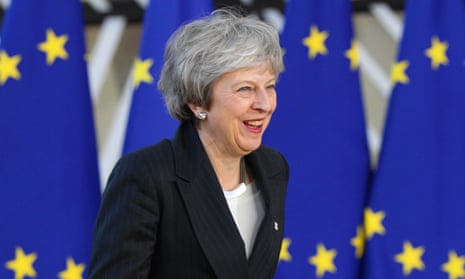Once again a Brussels summit and British politics cross paths like celestial bodies on intersecting orbits. For just a few moments a cold hard ball of EU reality eclipses the gaseous inferno that is Westminster. Theresa May has not secured any meaningful change to her withdrawal agreement. No sunset clauses will be introduced to the “backstop” that is designed to prevent a hard Irish border appearing after Brexit.
The EU stance looks uncooperative to many British observers. Hardline Brexiters will hold it up as proof that business cannot be done with these awful continentals. It is true that the European position is rigid, but that is a function of accommodating the interests of 27 countries in a single text – a legal treaty that has already required painstaking compromise. No one wants to undo a done deal.
One of the unique properties of the Brexit spectacle is its capacity to be boring and frightening at the same time. It is grindingly technical and predictable, which are characteristics of a dull thing. But watching something precious – the stability and prosperity of a nation – move on a slow conveyor belt into a grinding machine is also alarming. And if British audiences are bored, just imagine how it feels on the Brussels side of the table. At least Westminster politics has sudden twists and theatrical noises. Brexit, as experienced by EU leaders, is the same banal dialogue played on a loop. It goes roughly as follows:
UK: We are leaving.
EU: We wish you wouldn’t, but if you must, there is a process with one fundamental principle: you cannot retain privileges of EU membership without an obligation to uphold EU law. With that in mind, here are the options ...
UK: We do not like those options and refuse to choose between them.
EU: No other options exist.
UK: We believe they do.
EU: Tell us what they are.
(At this point the UK government wastes months arguing over whether it is better to use a jet pack or a magic feather to fly over a rainbow.)
UK: We would like to continue enjoying privileges of EU membership without obligations to uphold EU law.
EU: No.
The difference between the two approaches is that the EU side has been focused on a destination. In Brussels, the problem was understood in terms of an end state. What would be the terms of separation? But Westminster has been fixated on process and power games. The Tories have been consumed by the question of May’s leadership. Labour’s primary goal has been to bring down the government. Hence the obsession with votes of confidence, whether and when to have them.
If the problem you are trying to solve is May being in Downing Street, then removing her is a solution. And if you think the problem is a lack of Jeremy Corbyn in No 10 then, yes, putting him there would indeed solve that problem. But those are not actual answers to the questions that Brexit asks.
With so little time left, there are now three places to go.
Option one: exit with a deal almost exactly like the one May has negotiated. By deal here, I mean the withdrawal agreement – the legal text that serves as safe passage to a transition period from where other options for the long term can be developed. The withdrawal agreement can be ratified or not. Its many deficiencies, including the notorious backstop, are intrinsic to Brexit and would be the same for any party under any leader. Changing the prime minister doesn’t change EU law.
Option two: membership of the EU – the best available outcome in strategic and economic terms, but one that incurs serious political cost by enraging already furious leavers.
Option three: exit with no deal. An appalling idea recommended only by fools, liars and vandals who relish chaos for perverse ideological reasons.
Then there are the means of travel. Option one requires approval of the withdrawal agreement and an implementation bill in parliament. Option two is reached by rescinding the article 50 notice, which should, for democracy’s sake, be done after a referendum, although the result of that is unpredictable. Option three is easiest. It involves carrying on as we are, bickering about process, failing to cross tribal party lines in pursuit of consensus, refusing to be honest about what is available and watching the clock tick down.
Those are the choices. They aren’t complicated. The EU side identified them two years ago and spelled them out clearly. The British public is bored watching their politicians argue about the wrong questions. The EU is bored watching British politicians refuse to level with the public about the right questions. Everyone should be afraid of what happens in the absence of clear answers, because disaster by inaction is the default option.

